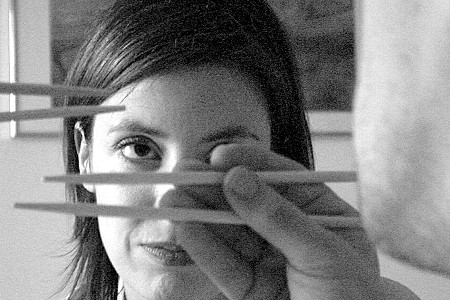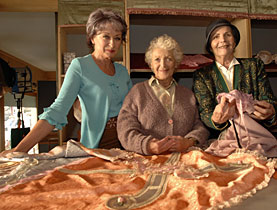Swiss cinema needs art house boost

The authorities have just announced a shake-up in Switzerland's struggling art house film industry – a welcome move, producer Thierry Spicher tells swissinfo.
The topic will most certainly be discussed at Swiss Cinema Day, held annually in honour of Swiss filmmakers and taking place at the Locarno Film Festival on Tuesday.
Nicolas Bideau – head of films at the Federal Culture Office – has called for production of art house films to be improved.
They currently make up 60 per cent of film output in the country, but only attract three per cent of cinema audiences, according to a study presented at the festival last week.
Spicher is a member of the Federal Film Commission which selects projects for development.
swissinfo: Should production houses, particularly small ones of which there are so many in Switzerland, be worried by the changes?
Thierry Spicher: Bideau said that art house cinema is weak because of shortcomings in the film development phase. We producers certainly have our intrinsic weaknesses, but so does the system. A bit of reorientation is necessary to encourage the contribution of money and skills during this phase.
Producers, who have been saying for some time they are essential to the film business, have already put forward proposals to encourage producers to assume greater responsibility as entrepreneurs.
swissinfo: Will Swiss cinema will lose its diversity?
T.S.: No, quite the opposite. Swiss cinema needs to create a virtuous circle – if we make better films, more can be shown at cinemas and we can make more of them. It will give them greater legitimacy in cultural policy.
We’re not saying fewer films should be made, but that films should be better produced and better financed. We’re not saying that you always have to make the same films for the same public.
The commission said production of art house films needs to be different. But the films and the particularities of this country, its writers, scriptwriters and directors, should not be lost. We don’t want a producer-driven cinema, but to put the producer at the centre of the system.
swissinfo: Some people fear a more professionalised system, saying art house cinema will lose its soul…
T.S.: Again, it’s not about making commercial or industrial cinema. It would be ridiculous to try and create a mini-Hollywood. It’s simply about producing art house cinema in a different way.
This change will take time, especially as Switzerland, which has linguistic regions with different cultures of reference, is a country with numerous and complex parameters.
There is a desire for Swiss cinema to act as a kind of “federalising” element, but it is acknowledged that the average quality of Swiss-produced films is not up to scratch. Everyone agrees that production has to be professionalised and project development has to be improved.
swissinfo: You are a producer and also a member of the film commission which selects projects for development. Do you have to sleep with a knife under your pillow?
T.S.: No! But it’s true that its highly competitive and that there are more projects put forward than selected. Having to decide is no easy task. However, the project evaluation procedure is subject to criteria, discussions and analyses made in the commission. This puts your personal responsibility into perspective and thus the number of knives under your pillow!
swissinfo: Is it easier or harder for Swiss producers than abroad?
T.S.: Both! It’s easier because it’s a rich country and you can hold down a rent-paying job while also doing films. But a small producer can’t afford to be choosy. If he has a project he generally tends to see it through at all costs, even if it is unfinished.
But the situation is also more difficult because there is less money around at the moment for films. Belgium had ten films at Cannes this year, but proportionally around the same amount of money for cinema. You have to look abroad to assess our own system.
There are many positive signals in Switzerland. The sector is becoming more professionalised, policy is changing with the new generation and there is a very dynamic cinema section at the culture office. The lights are orange but it’s up to us to change them to green!
swissinfo-interview: Carole Wälti in Locarno
The third Swiss Cinema Day is taking place in Locarno on August 12. The event, which is presented jointly by the Federal Culture Office, the Locarno Film Festival, and Swiss Films, is being held in honour of Swiss film-makers.
Its theme will be “There’s more than one face to Swiss films”.
Three Swiss films will celebrate their world premieres on this day: Marcello Marcello by Denis Rabaglia, Luftbusiness by Dominique de Rivaz, and the short animated film Retouches by Georges Schwizgebel. The Appellations Suisse programme at the Festival is screening 11 Swiss films with an international appeal.
There were 73 production houses in Switzerland in 2007. Their central role is to ask for funds and manage the film investments.
Many are small – 47 companies last year were in charge of a one project, from large coproductions to small documentary films.
In 2007 only seven production companies received more than SFr1 million ($920,000) from the Federal Culutre Office for 27 different projects. The culture office invests SFr20 million in film production, of which half goes to art house productions.
Spicher is the producer of numerous films, including Home by Ursula Meier.

In compliance with the JTI standards
More: SWI swissinfo.ch certified by the Journalism Trust Initiative



You can find an overview of ongoing debates with our journalists here. Please join us!
If you want to start a conversation about a topic raised in this article or want to report factual errors, email us at english@swissinfo.ch.